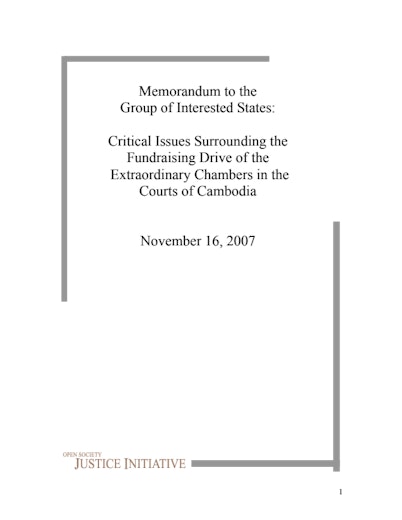Arrests Highlight Need for Reform at Khmer Rouge Court
This week's arrest of two high-level Khmer Rouge leaders, Ieng Sary and Ieng Thirith, marks a significant step forward for Cambodia's war crimes tribunal, the Open Society Justice Initiative said today.
But in a report released today, the Justice Initiative urges the Extraordinary Chambers in the Courts of Cambodia to take immediate action to improve the court's functioning and calls upon donor states and the United Nations to take more assertive action to ensure that needed reform takes place.
"Additional donor funds alone will not contribute to the success of the court," said Robert O. Varenik, the Justice Initiative's acting executive director. "For the court to succeed in its historic task, international donors and the United Nations must take immediate, concrete steps to address shortcomings in the court's administration and leadership."
Ieng Sary and Ieng Thirith, the first husband and wife to be charged by an international court, were arrested at their Phnom Penh home on November 12 and taken into the court's custody. Ieng Sary was deputy prime minister and foreign minister of Democratic Kampuchea during the Khmer Rouge rule between 1975 and 1979. He is charged with crimes against humanity and war crimes. His wife, Ieng Thirith, was minister of social affairs and education and is charged with crimes against humanity.
These arrests come in advance of the Extraordinary Chambers in the Courts of Cambodia appeal to donor states for an estimated $45 million in additional funding to ensure the trials can continue through 2010. They underscore the significant strides the court is making and why it should be supported by the international community. But in its new report, Critical Issues Surrounding the Fundraising Drive of the Extraordinary Chambers in the Courts of Cambodia, the Justice Initiative urges states to condition future funding on demonstrated results addressing administrative, transparency, and leadership problems at the court.
According to the Justice Initiative's latest report, the court needs to:
- Effectively address corruption allegations, minimize translation backlogs, institute best practices in human resource management, and prepare the courtroom and other physical structures for trial;
- Increase transparency through the more frequent release of public information about the court's operations;
- Develop an active management oversight group to ensure all donor funds are administered effectively and efficiently; and
- Work with a UN-appointed special advisor to the court, to assist with administrative and management reforms and monitor their effectiveness.
"These arrests highlight the urgent need for the [court] to address crucial issues affecting the court's administrative efficiency and its ability to meet international fair trial standards," said Varenik. "International donors who are supporting the court should link future donations to the court's efforts to address these challenges urgently and effectively."
Topics
- Climate Justice
- Digital Rights and Fair Elections
- Discrimination and Racial Justice
- International Crimes
